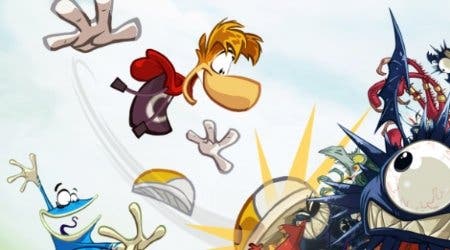Game of the Week: Rayman Origins
Why 2011 wasn't a patch on 2001 - and how Rayman, of all people, can help.
A friend posited recently that this has been the best year in gaming since 2001. I've got to disagree. The quality's been exceptional, no doubt, and over the last few months there's been any number of handsomely produced, craftsmanlike distractions competing for our free time, from Arkham City to Forza 4, Skyrim to Skyward Sword. They've all been gigantic, too: quality and value! There's never been a better time to buy your gaming by the yard.
But here's the thing, I've played absolutely all of them before. Name a single game released in 2011 that felt truly new. It's a real struggle.
From Dust comes close, but its novelty is tinged with nostalgia for a dormant species of God game. Bastion and Super Mario 3D Land are hardly brand new play styles, but they do find ways to present the action that are startlingly fresh. Might & Magic: Clash of Heroes is a cunningly spliced hybrid, and the indie scene, despite its collective obsession with puzzle-platformers and twin-stick shooters, has of course turned up the odd true original like SpaceChem or Fate of the World.
Examples are still harder to find in the mainstream of boxed console and PC games. Even arthouse darlings like Dark Souls and Child of Eden are strictly formulaic follow-ups. L.A. Noire and Dead Island stood out by virtue of offering a number of familiar elements in unfamiliar arrangements - and by not having numbers after their names.
Indeed, Dead Island's tremendous commercial success, despite mixed reviews, strikes me as one of the most significant events of the year in gaming. An original IP from a small publisher, with a Metascore of 71, is simply not supposed to sell in the numbers it did. It contradicts the equation that rules the core gaming business right now: big brand + big budget + critical consensus = $$$.
"Here was an original concept, simply and powerfully conveyed, in the form of a game from a smaller publisher and developer. Here was a game that came without the baggage of expectation, franchising, pigeonholing or strung-out hype," I wrote in a preview of it early this year. And I think that's what we all responded to in it, and sought from it: might this actually be something new?
Maybe it only half was - and I know we at Eurogamer get some stick for taking a hard line on Dead Island's faults. But whatever your opinion of the game, you have to admire Deep Silver and Techland for sticking their necks out, and you have to regard its success as both richly deserved and a note of encouragement in a year of dispiriting homogeneity.
So no, although I've played lots of great games this year (more, I'll agree, than in the few previous years), I can't compare it to where we were a decade ago. 2001 was the year of Ico, Halo and Grand Theft Auto 3 - not to mention Advance Wars, Super Monkey Ball, FreQuency, Pikmin and Metal Gear Solid 2. Setting debates about formal innovation or absolute quality to one side, any one of the games I've just mentioned felt more vital, more daring, more surprising and more exciting than anything released in 2011.
We haven't exactly come a long way in 10 years, have we? The pace of innovation in gaming was always going to slow down with the pace of technological development, but that's no excuse for the depressing conservatism we're seeing right now.
So here's to Dead Island, warts and all. We need more (and better) like you in future, or the next decade is going to be very dull indeed.
Rayman Origins
All of that might seem an odd preamble to celebrating the release of a classical 2D platformer in a popular series, but I'm chalking up Rayman Origins on the side of the angels for one reason: how it looks.
Its hyperactive animation and the extravagant, Gallic zaniness of its cartoon art style won't be to all tastes, while the gameplay simply combines the Rayman of old with the co-op mechanics of New Super Mario Bros. Wii and LittleBigPlanet. But Rayman Origins looks like nothing else, and that's a technical and artistic achievement which shouldn't be overlooked right now.
Not a single polygon is employed, but ultra-detailed and expressive line drawings are layered and layered and layered again in so many fine parallax tiers that a subtle yet powerful sense of depth is created. It's a completely different approach to the "2.5D" employed by Media Molecule or Nintendo, or the self-consciously flat shadow-puppetry of PlayDead's Limbo, or the retro pixel art of WayForward's games. It is, in short, new.
"Each frame could be paused, printed off and hung on the wall. Each sprite is packed with light-touch charm that's endlessly engaging," wrote Simon in our Rayman Origins review. "It's also beautiful. The forest glades, like something out of My Neighbour Totoro, through which Rayman and his friends bound in the early stages of the game - a parade of generous stacked parallax layers - dazzle, while the more generic fire, ice and underwater worlds exhibit such artistic imagination as to transcend their predictability.
"Bespoke animations pile high, testifying to the developer's commitment, enthusiasm and talent for extracting the DNA not only of Rayman himself but also of the classic 16-bit platformer. In doing so, they offer a window back into what was once the most popular genre in the medium while evolving it into something fresh."
Rayman Origins is hardly a beacon of innovation in game design, but in one crucial area it has sought to do something that no-one else is doing, and that no-one else has done before. (Also, it's loads of fun.) It's not going to save gaming, but it does show us another way, and for that alone we should be grateful.

